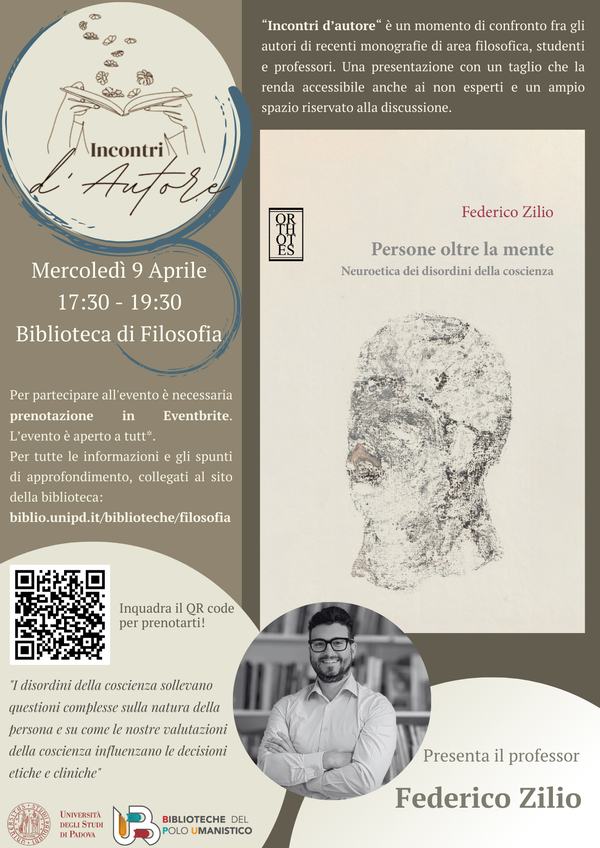Incontri d'autore - Persone oltre la mente. with Federico Zilio
In this meeting of the "Incontri d'autore" series of events we will discuss with Professor Federico Zilio his latest work
- https://biblio.unipd.it/en/libraries/filosofia/notizie-eventi/incontri-dautore-persone-oltre-la-mente-con-federico-zilio
- Incontri d'autore - Persone oltre la mente. with Federico Zilio
- 2025-04-09T17:30:00+02:00
- 2025-04-09T19:30:00+02:00
- In this meeting of the "Incontri d'autore" series of events we will discuss with Professor Federico Zilio his latest work
With “Incontri d’autore” we intend to create moments of discussion between the authors of recent monographs in the philosophical area, students and professors. The meetings include a presentation with a style that makes it accessible even to non-experts and a large space reserved for discussion.
In this meeting, Professor Federico Zilio presents his new work: People beyond the mind. Neuroethics of disorders of consciousness.

Is a patient in a vegetative state no longer a person or is he still a person? This question may legitimately arise in the face of patients with disorders of consciousness who, despite recent neurotechnological developments, are still the subject of a very complex study full of crucial ethical implications. An investigation into the conceptual cornerstones of this theme is still partially lacking – especially with respect to the underlying anthropology that inspires neuroethics; the volume therefore proposes a reflection on the concept of person in a moral, ontological and historical sense, to then decline it within the context of disorders of consciousness, with particular attention to the neuroethical and bioethical issues of the vegetative state. What do we mean when we talk about people? Are patients with disorders of consciousness people? Can an analytical and historical-conceptual investigation guide neuroethics in the care and clinical management of such patients? These are questions that do not only concern the theoretical-philosophical field, but that are directly linked to a practical need to rethink the meaning of the concept of person, both through an ethical-ontological approach and in light of recent neuroscientific studies.
In 2015, my father was diagnosed with amyotrophic lateral sclerosis. As is well known, ALS is a neurodegenerative disease characterized mainly by the progressive paralysis of voluntary muscles. In the following years, my father gradually lost the ability to move, to the point of being bedridden and immobile, except for his eyes and eyelids that allowed him to communicate with us via an eye tracker (a device that measures the position and movement of the eyes to select letters and words on the screen) or, very simply, with his gaze. In clinical jargon, this situation is usually called classic locked-in syndrome. In the last period of his life, this last communicative ability weakened, making communication even more difficult or – at times – impossible; still in technical terms, this is considered the transition to the so-called complete locked-in syndrome.
Some might wonder what this has to do with disorders of consciousness; after all, ALS is a motor neuron disease and generally does not affect – at least directly – consciousness, while locked-in syndrome is not usually categorized as a true disorder of consciousness (although some scholars – like myself – believe that it can involve some alterations of consciousness in the complete form of the syndrome). But the point is another. While my father was in the phase of almost total paralysis, sometimes it could happen that some people spoke of him in reference to the period before the disease, as if they could only think of him based on their memory of when he was healthy, with the character and personality that everyone knew. And yet, he was always present with us until the end, despite the communication difficulties, the lack of movement and the loss of a whole series of possibilities and abilities typical of a human being. In other words, for some it was as if there had been a caesura between what my father had been for almost his entire life and what he was in the last period of his illness.
If in the case of my father, who maintained a certain degree of responsiveness almost until the end, the doubt that he was a person never arose; on the contrary, when dealing with individuals affected by disorders of consciousness (in particular, the vegetative state), the question seems to take on greater relevance not only philosophically but also humanly, precisely on the basis of the lack – real, presumed or apparent – of responsiveness and awareness. As some argue, if the subject is no longer able to possess a continuous and coherent mental life, has lost the ability to be aware of himself and the world around him to the point of not being able to maintain any relationship with other individuals, can he be considered the same person he was before? Or, even, is he still a person? People beyond the mind. Neuroethics of Disorders of Consciousness attempts to answer these questions, based on the fact that for us “person” is an intrinsically moral term and linked to the promotion of dignity. It is clear that denying or affirming the persistence of the person in patients with disorders of consciousness can lead to very different consequences in terms of care and medical practice.
The Author
Federico Zilio is a researcher and professor at the Department of Philosophy, Sociology, Pedagogy and Applied Psychology of the University of Padua. Since 2018 he has also collaborated with the Mind, Brain Imaging and Neuroethics research unit of the University of Ottawa, directed by Prof.
Apr 09, 2025 from 05:30 to 07:30 (Europe/Berlin / UTC200)
Philosophy Library - University of Padua